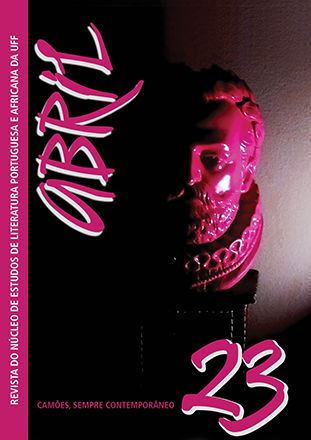The Camonian appropriation in the 21st century: Gonçalo M. Tavares and India
DOI:
https://doi.org/10.22409/abriluff.v11i23.30285Keywords:
Luís de Camões, Portuguese contemporaryfiction, Gonçalo M. Tavares.Abstract
Starting from the recognition that Luís de Camões’ work is the headstone of Portuguese literary canon, this article intends to think about the relationship of The Lusiads, as a symbol of the very memory of a culture, with A trip to India: contemporary melancholy (an itinerary), by Gonçalo M. Tavares. From the fate expressed in the title to the repetition of the structure of the Camonian epic, the 21st century text highlights the influence of the 16th century work. On the other hand, the displacement of the character Bloom in the context of persecution and escape problematizes the epic, while also advancing in the dialectical reading of contradictions of love. Following the itinerary of this (anti)epic, this article seeks to point out con- vergences and divergences between A trip to India and The Lusiads.Downloads
Downloads
Published
How to Cite
Issue
Section
License
I authorize the journal Abril - NEPA/UFF to publish the paper of my authorship/responsibility that I now submit, in case it is accepted for online publication.
Moreover, I declare that this contribution is original, that it was not submitted to any other editor for publication, and I sign the present declaration attesting the truth of all its contents.
The copyright of the works published at the virtual space of the journal Abril - NEPA/UFF are automatically entitled to the journal. Their total or partial reproduction is conditioned to the authors' citations and publication data.

Abril is licensed under a Creative Commons - Attribution-NonCommercial 4.0 International (CC BY-NC 4.0).









